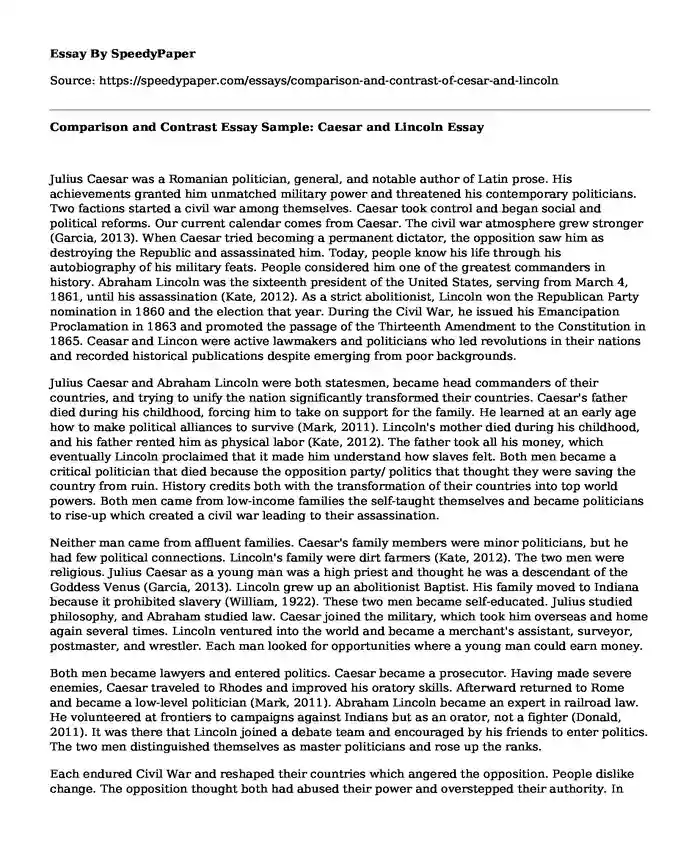
| Essay type: | Compare and contrast |
| Categories: | Leadership analysis Abraham Lincoln Julius Caesar |
| Pages: | 3 |
| Wordcount: | 749 words |
Julius Caesar was a Romanian politician, general, and notable author of Latin prose. His achievements granted him unmatched military power and threatened his contemporary politicians. Two factions started a civil war among themselves. Caesar took control and began social and political reforms. Our current calendar comes from Caesar. The civil war atmosphere grew stronger (Garcia, 2013). When Caesar tried becoming a permanent dictator, the opposition saw him as destroying the Republic and assassinated him. Today, people know his life through his autobiography of his military feats. People considered him one of the greatest commanders in history. Abraham Lincoln was the sixteenth president of the United States, serving from March 4, 1861, until his assassination (Kate, 2012). As a strict abolitionist, Lincoln won the Republican Party nomination in 1860 and the election that year. During the Civil War, he issued his Emancipation Proclamation in 1863 and promoted the passage of the Thirteenth Amendment to the Constitution in 1865. Ceasar and Lincon were active lawmakers and politicians who led revolutions in their nations and recorded historical publications despite emerging from poor backgrounds.
Julius Caesar and Abraham Lincoln were both statesmen, became head commanders of their countries, and trying to unify the nation significantly transformed their countries. Caesar's father died during his childhood, forcing him to take on support for the family. He learned at an early age how to make political alliances to survive (Mark, 2011). Lincoln's mother died during his childhood, and his father rented him as physical labor (Kate, 2012). The father took all his money, which eventually Lincoln proclaimed that it made him understand how slaves felt. Both men became a critical politician that died because the opposition party/ politics that thought they were saving the country from ruin. History credits both with the transformation of their countries into top world powers. Both men came from low-income families the self-taught themselves and became politicians to rise-up which created a civil war leading to their assassination.
Neither man came from affluent families. Caesar's family members were minor politicians, but he had few political connections. Lincoln's family were dirt farmers (Kate, 2012). The two men were religious. Julius Caesar as a young man was a high priest and thought he was a descendant of the Goddess Venus (Garcia, 2013). Lincoln grew up an abolitionist Baptist. His family moved to Indiana because it prohibited slavery (William, 1922). These two men became self-educated. Julius studied philosophy, and Abraham studied law. Caesar joined the military, which took him overseas and home again several times. Lincoln ventured into the world and became a merchant's assistant, surveyor, postmaster, and wrestler. Each man looked for opportunities where a young man could earn money.
Both men became lawyers and entered politics. Caesar became a prosecutor. Having made severe enemies, Caesar traveled to Rhodes and improved his oratory skills. Afterward returned to Rome and became a low-level politician (Mark, 2011). Abraham Lincoln became an expert in railroad law. He volunteered at frontiers to campaigns against Indians but as an orator, not a fighter (Donald, 2011). It was there that Lincoln joined a debate team and encouraged by his friends to enter politics. The two men distinguished themselves as master politicians and rose up the ranks.
Each endured Civil War and reshaped their countries which angered the opposition. People dislike change. The opposition thought both had abused their power and overstepped their authority. In each case, the opposition met, planned, and executed the assassinations. His opposition thought they would return freedom to their countries (God in America, 2010). After their assassinations, the next leadership step in and continued.
Both men had volumes of writing when they died. Caesar's war treaties describe his battles and campaigns in Spain, France, Germany, and Briton (Mark, 2011). He documents how the people in each country lived. Some historians believe he wrote his autobiographical-historical volumes to justify his wars and such actions. Lincoln leaves his Collected Works, speeches, and letters. Today, people study their writings because they were great politicians.
References
Donald, D. (2011). Lincoln. New York: Simon & Schuster.
Garcia, B. (2013). Venus. Retrieved from https://www.ancient.eu/venus/.
God in America. (2010). God in America - People - Abraham Lincoln. Retrieved from http://www.pbs.org/godinamerica/people/abraham-lincoln.html.
Kate, K. (2012). Abraham Lincoln's Childhood: Growing Up to Be President - America Comes Alive. Retrieved from https://americacomesalive.com/2013/02/12/abraham-lincoln-1809-1865-president-from-1861-1865/.
Mark, J. (2011). Julius Caesar. Retrieved from https://www.ancient.eu/Julius_Caesar/.
William, N. (1922). The Mystery of Abraham Lincoln's Religion Cleared up, by William D. Nowlin. Retrieved from http://baptisthistoryhomepage.com/nowlin.16.lincoln.relgion.html.
Cite this page
Comparison and Contrast Essay Sample: Caesar and Lincoln. (2022, Jun 10). Retrieved from https://speedypaper.com/essays/comparison-and-contrast-of-cesar-and-lincoln
Request Removal
If you are the original author of this essay and no longer wish to have it published on the SpeedyPaper website, please click below to request its removal:
- Free Essay Sample on a Rape on Campus
- Global Enrichment Consultancy on International Level, Essay Example
- Essay Example on Proper Customer Service
- Personal Essay Example on The Waves Knock Over
- Psychology Essay Example on Building Self-Esteem
- Dickinson's Life and Poetry, Essay Example
- Reflection Paper Example - External Barriers
Popular categories




